Key takeaways:
- Open-source contributions foster community engagement and support, emphasizing that the experience is about relationships rather than just coding.
- Understanding project guidelines and establishing communication with maintainers are crucial for successful contributions.
- Embracing mistakes and learning from feedback is vital for personal growth in open-source development.
- A focus on user experience enhances the impact of contributions, highlighting the importance of creating solutions aligned with user needs.
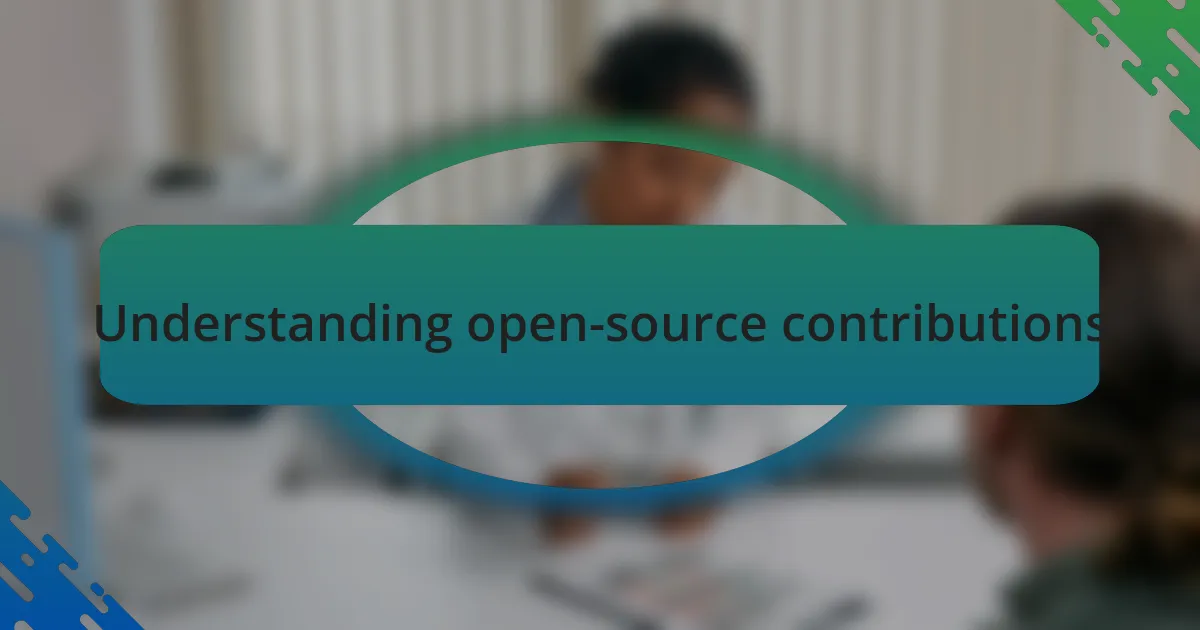
Understanding open-source contributions
When I first dove into open-source contributions, I was struck by the sheer diversity of projects available. It felt exhilarating to know that anyone, regardless of their background or experience level, could contribute to software that might be used by thousands. This accessibility is what makes open-source initiatives so unique and powerful; it democratizes software development.
One of the most significant aspects of contributing to open-source is the community that forms around it. I remember my initial collaboration on a project where my input, though small, was met with encouragement and support. This experience not only boosted my confidence but also made me realize that open-source contributions aren’t just about coding; they’re about building relationships and learning from one another.
Have you ever thought about how much you can learn from just reviewing someone else’s code? I often find myself amazed at the variety of coding styles and problem-solving approaches. Each contribution adds a layer of depth to the project, and through this, I’ve gained invaluable insights that have shaped my own development practices. Understanding these contributions creates a rich tapestry of knowledge that elevates not just individual skills but the entire ecosystem of open-source software.
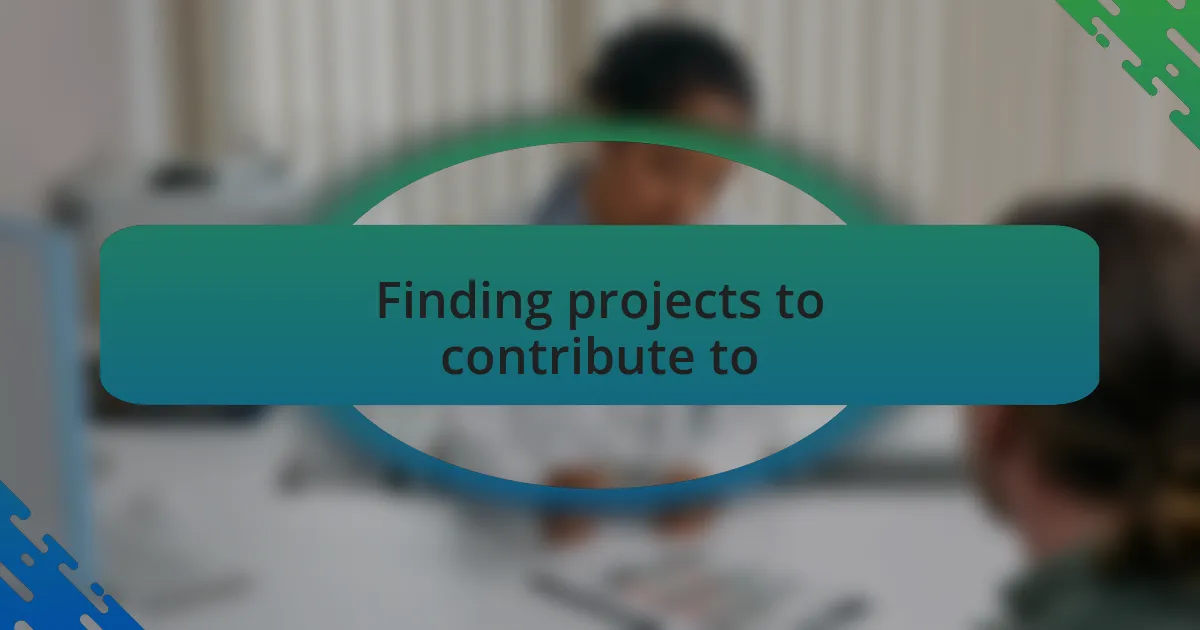
Finding projects to contribute to
Finding projects to contribute to can be both exciting and overwhelming. I remember spending hours browsing platforms like GitHub, feeling like a kid in a candy store. The trick is to look for projects that genuinely interest you or align with your own skills. For example, I found a repository focused on educational tools, and my passion for teaching made it an easy choice — it felt more like a calling than just a contribution.
One practical approach I discovered was to check out issues marked as “good first issue” or “beginner-friendly.” When I came across these labels, it was like a welcoming nod, inviting me to join the conversation. I also found that engaging with the project’s community through forums or chat rooms can provide guidance and insight into where contributions are most needed. Have you ever thought about how asking questions can lead to unexpected collaboration? I certainly have, and some of the best connections I made started with a simple inquiry.
Lastly, I recommend checking out contribution platforms like CodeTriage or First Timers Only. The sense of focus these platforms provide genuinely helps narrow down your options. When I ventured into one of these curated lists, it felt singularly rewarding to see my skills put to use on tangible projects. By aligning my passion with the right projects, I not only enhanced my abilities but also became part of communities that echoed my interests.
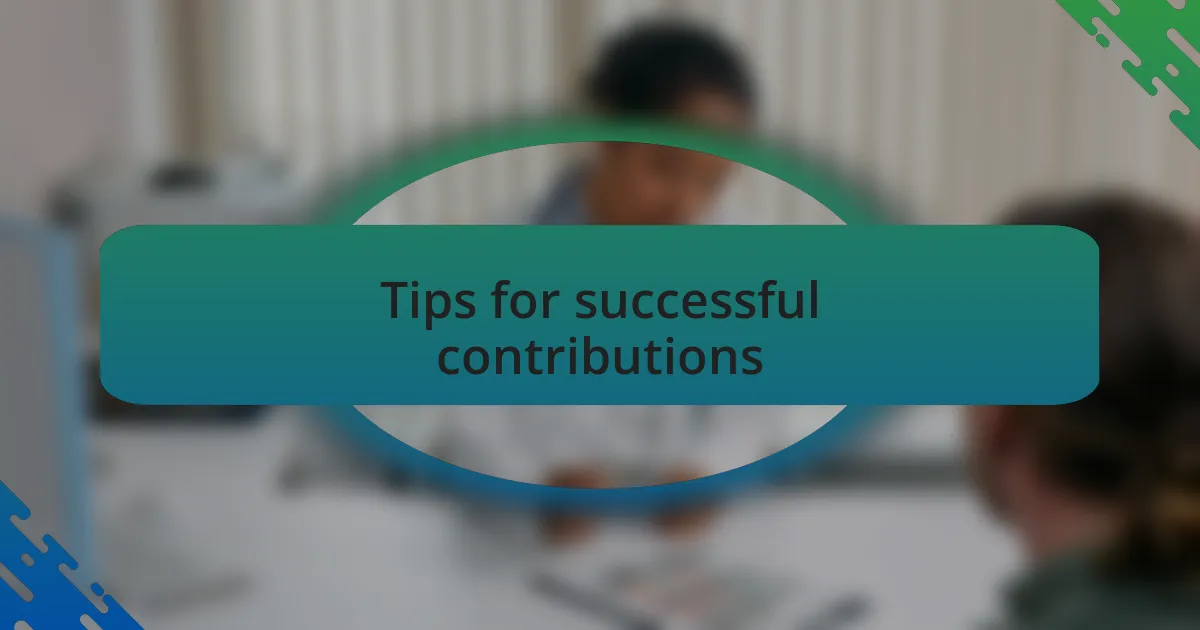
Tips for successful contributions
Understanding the project’s contribution guidelines is crucial for a successful experience. I vividly remember when I first submitted a pull request without thoroughly reading the guidelines; it felt like trying to enter a club without knowing the dress code. Taking the time to familiarize yourself with how a project operates not only saves time but shows respect to the maintainers. Have you ever noticed how clarity in direction leads to smoother collaboration?
In my experience, establishing a connection with project maintainers can significantly impact your contributions. Early on, I sent a friendly message introducing myself and expressing interest in a project. This small step opened a dialogue that not only guided my contributions but also made me feel valued within the community. It reinforces the notion that collaboration is not just about coding—it’s about building relationships.
Don’t underestimate the power of thorough documentation in your contributions. I learned this the hard way when my first major feature submission lacked clear instructions for use. The feedback I received was constructive and emphasized the importance of clarity—nobody wants to guess how a feature works. Taking the time to include detailed comments and documentation proves invaluable, ensuring your hard work is easily understood and appreciated by others.
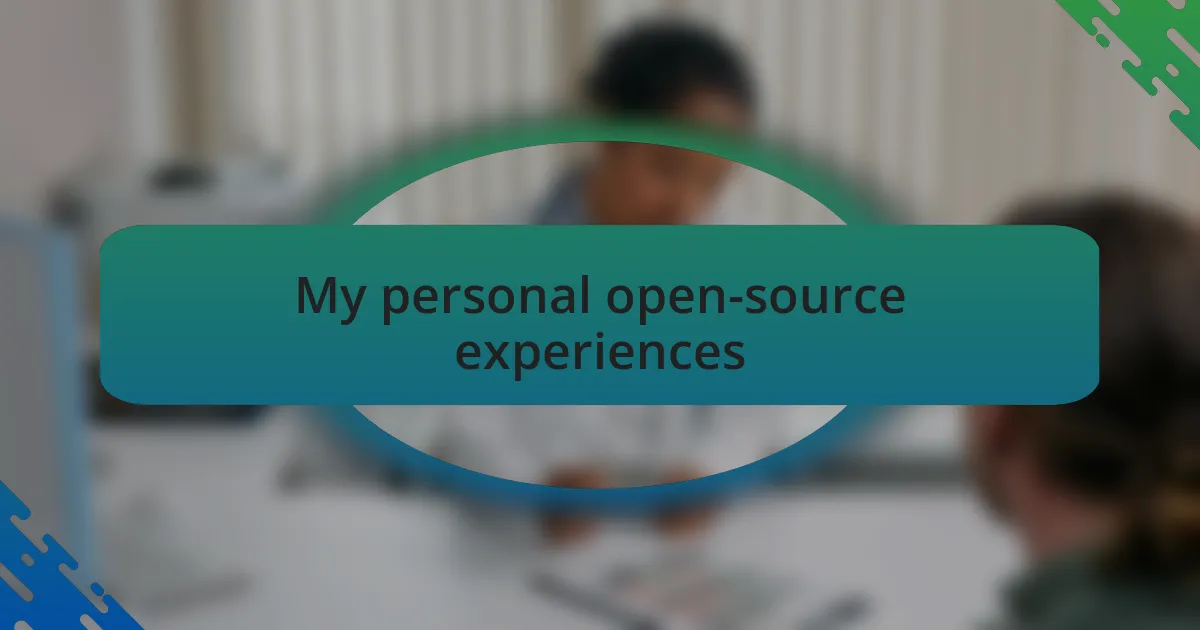
My personal open-source experiences
When I first ventured into the world of open source, I was both excited and intimidated. I remember my initial experience when I attempted to contribute to a popular library. It was daunting to navigate the codebase and understand how my changes would fit in. I felt like an outsider looking in, but slowly, as I familiarized myself with the code and sought help from the community, that feeling of intimidation shifted to one of empowerment. Have you ever felt a mix of fear and excitement when facing a new challenge?
One of my most memorable contributions was for a project that aimed to make web accessibility a priority. In my enthusiasm, I realized I had overlooked testing my changes across different browsers. When the maintainers pointed out the oversight, it stung a bit, but it also sparked a determination within me to improve. It taught me an invaluable lesson: each mistake is a stepping stone toward growth. Do you think it’s fair to say that our greatest lessons often come from our missteps?
I still cherish the friendships formed through these open-source projects. There’s a unique bond created when people collaborate towards a common goal, regardless of geography. I vividly recall late-night discussions on features and bugs with contributors from around the world, where everyone brought their unique perspectives and experiences to the table. It made me realize that open source is not just about coding—it’s about shared passions and community spirit. Have you experienced that sense of belonging in your own contributions?
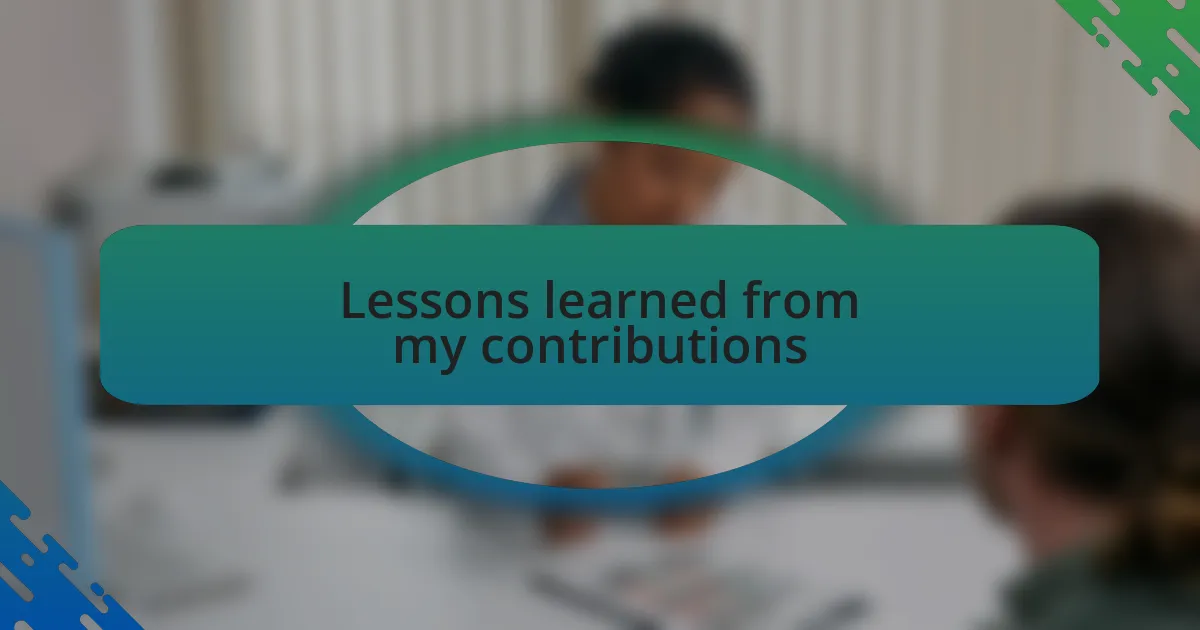
Lessons learned from my contributions
There was a moment when I submitted a pull request only to realize I had overlooked the coding standards of the project. It felt a bit like a slap in the face when my submission was rejected. However, that rejection was pivotal; it highlighted the importance of understanding community guidelines and reinforced how crucial it is to pay attention to detail in collaborative efforts. Have you ever experienced that sting of feedback that ultimately made you a better contributor?
Working on a project with a tight deadline taught me the value of time management under pressure. I found myself juggling multiple tasks, constantly learning how to prioritize effectively. It was exhilarating yet overwhelming, and it revealed the necessity of clear communication within a team to keep everyone aligned. Have you ever felt the rush of tight timelines pushing you to perform at your best?
One project focused on enhancing user authentication methods. I worked closely with a designer on usability, pushing me to appreciate the synergy between code and user experience. I learned that technical proficiency alone isn’t enough; understanding the end-user’s perspective is essential. This experience solidified my belief that contributions go beyond just writing code—they are about creating solutions that genuinely resonate with users. How has your perspective changed when you viewed projects through the lens of user experience?